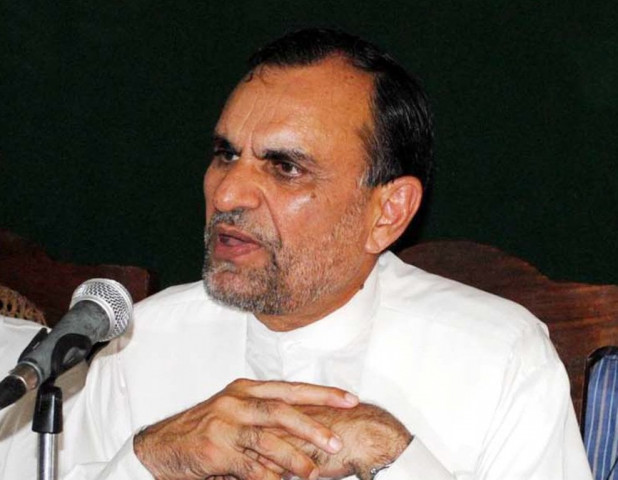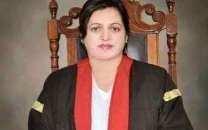Azam Swati's case referred to FBR, police
Bench to examine his case after departments submit reports

Azam Swati. PHOTO: PPI
The decision was taken in view of the amicus' recommendations on Joint Investigation Report (JIT) findings.
After these departments submit reports, the court will examine his qualification by exercising jurisdiction of quo warranto.
Azam Swati's counsel Ali Zafar requested the three-judge bench headed by Chief Justice Mian Saqib Nisar to dispose of the case to ensure a fair trial under Article 10A.
Swati resigns on ‘moral grounds’
Chief Justice Saqib Nisar, however, declined the request and said Mr Swati belonged to the ruling party, and thus, the report should be submitted to ensure fairness.
The CJP said that the apex court can directly conduct trials under Article 184 (3) of the constitution.
Faisal Siddiqi, who has been appointed as amicus by the Supreme Court submitted his reply about the qualification/ disqualification under Article 62 (1) of the constitution. Siddiqi did not endorse the former federal minister's disqualification in view of JIT findings.
Faisal Siddiqi in his reply stated that in view of the serious allegations made in the JIT report, especially, in the context of the alleged violation of the tax laws, alleged misdeclarations before the ECP and FBR, alleged violation of building laws, assets allegedly disproportionate to the known sources of income, the role of the police in the incident of 26.10.2018, especially the alleged misuse of the criminal law against the Niaz Muhammad family, and the role of the Ministry of Interior and Establishment Division in the transfer of the former IGP, Islamabad, Mr. Jan Muhammad, it was important and appropriate that the relevant authorities, namely, FBR, ECP, CDA, the IG Islamabad, Ministry of Interior, Establishment Division, NAB, State Bank, the Former IG, Islamabad, Jan Muhammad and Niaz Muhammad family, should be called upon to respond to the JIT report as it concerns them. Only after considering the responses by these concerned authorities and persons and counter-responses by Muhammad Azam Khan Swati, can the Amicus Curiae give any definitive opinion in this case.
It is also stated that there is no legal precedent of the superior courts in which it has been held that in exercise of powers under Article 184(3), Constitution, 1973, a member of Parliament can be disqualified under Article 62(1)(f) constitution, if he misuses his authority/public power by interfering in the appointment/removal of public servants for private gain.
"In exercise of powers under Article 184(3), Constitution, 1973, this court can direct the institution of criminal cases under Pakistan Penal Code, 1860 and/or the NAB Ordinance, 1999 (if found applicable after considering all the material on the record) against Azam Khan Swati and other relevant persons, if it is of the opinion that offence(s) has been committed under the Pakistan Penal Code, 1860, and/or the NAB Ordinance, 1999 (if found applicable after considering all the material on the record)"
Siddiqi also stated that there was no legal precedent in which it was held that in the exercise of powers under Article 184(3), a member of Parliament can be disqualified under Article 62(1)(f), Constitution, 1973, if he violates the civil law for personal gain. In exercise of powers under Article 184(3), this court can direct the CDA to inquire into these alleged violations and to take actions in relation to any violation in accordance with law, he adds.
Earlier, Ali Zafar on behalf of Swati informed the bench that the former federal minister had since resigned from his office as minister in order to face the allegations against him and even a case had been registered against his son and employees in which proceedings were taking place. Barrister Zafar submitted that the JIT report contained many allegations against Swati but they needed to be proved in accordance with law before a trial court.
According to Barrister Zafar, the JIT was an investigative agency and not a substitute for a Court and its report was a mere allegation and not a final verdict which was enforceable on its own. Consequently, the principle of fair trial enshrined in Article 10-A of the Constitution required that all the matters raised by the JIT should be sent to the respective forums/courts/tribunals for trial and it was only if the allegations were proved the Supreme Court could proceed under Article 62 against Swati for his disqualification.
Analysing the report, Zafar submitted that the JIT report contained five allegations.
Firstly, as regards the criminal case and the question whether Swati's son and servants or the accused were aggressors, this involved criminal liability and may be sent for trial as per law and the trial court would decide the true facts.
Misuse of authority? JIT submits report about Swati’s use of influence
Secondly, as regards the allegation that Swati was involved in the transfer of IGP Islamabad, the JIT had investigated and confirmed that Swati had no involvement in the matter and, hence, no action needed to be taken in respect of this.
Thirdly, Barrister Zafar submitted that the JIT had alleged there had been concealment of assets and income tax has been avoided and this required further probe by FBR. Zafar submitted that his client was willing to face any enquiry by FBR as per law and would treat this as an opportunity to clear his name. Hence, this issue may be sent to FBR for initiating any legal proceedings in accordance with law.
Fourthly, as regards the allegations of encroachment etc., if CDA, so deems fit, it may take action and Swati would defend himself before appropriate forum as per law.
Fifthly, as regards the allegation of any concealment of assets and misdeclaration in nomination forms, Barrister Zafar submitted that it was only after legal proceedings were finalized with the FBR that the question of any misdeclaration could be determined.



















COMMENTS
Comments are moderated and generally will be posted if they are on-topic and not abusive.
For more information, please see our Comments FAQ